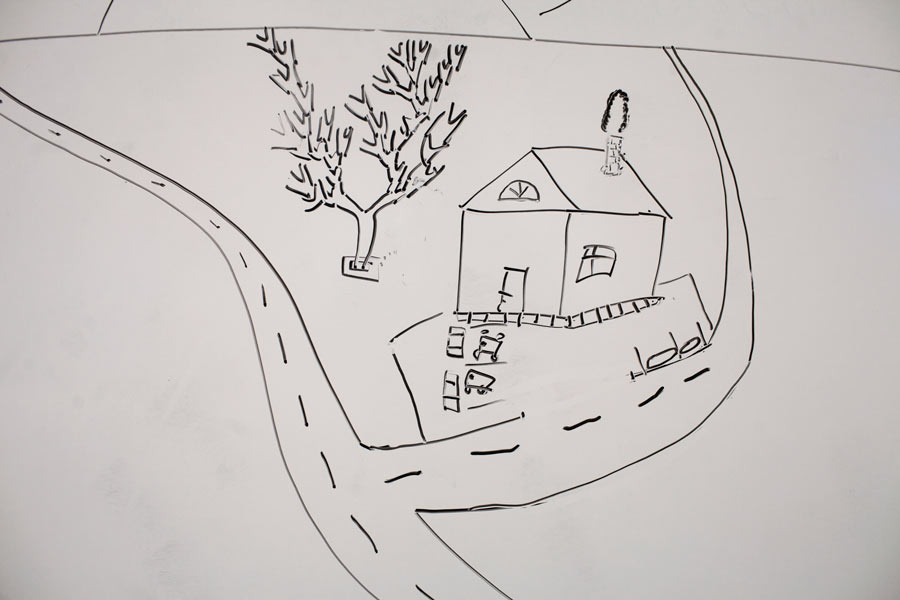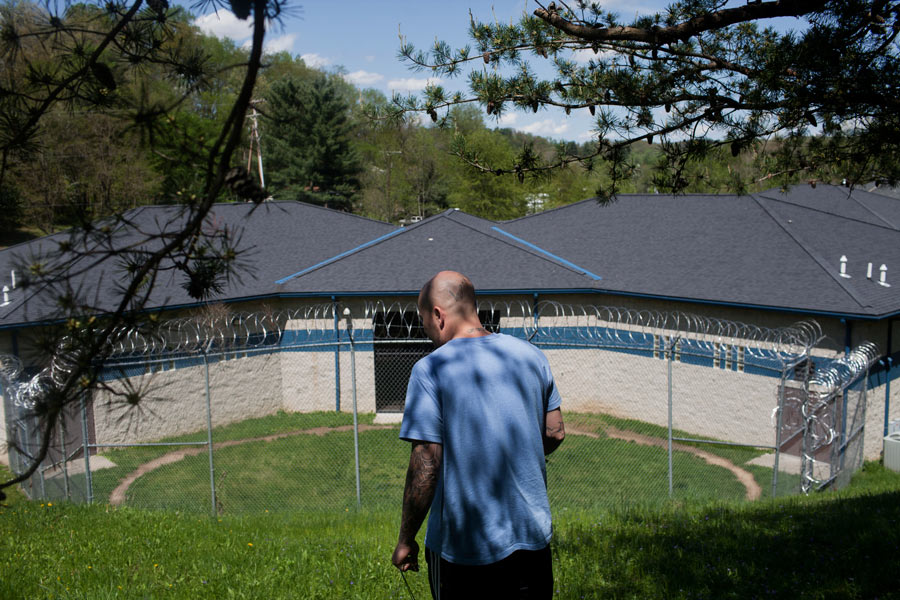Previous | 1 | 2 | 3 | 4 | Next
Almost Out
(Continued)
THE COUNSELOR
Scott Weaver is the Program Manager at SEPTA. Small and calmly spoken, he is direct and formal. Known by the guys as fair and consistent, he listens intently, especially when one of the guys is in the soft chair parked next to his desk. "I want to run this as much like a school as possible," he says. He has spent 17 years at SEPTA, after studying Social Work at Ohio University, a few towns over. Asked to profile the typical offender he deals with, he does not have to think hard.

A drawing of an idealized home remains on a whiteboard in a classroom. The key difference between SEPTA and other prisons is that residents are required to participate in counseling programs.
"Opiate dependant property offender." There has been a shift in recent years—before it was methamphetamine, and now it is pills and heroin. The education level and the background of the residents does not change much. But he is seen enough to believe that as individuals, they can.
"The ultimate aim is to be able to get these guys to want to change their behavior, change their life but you have to do that through programming, you can't do that through rules, regs and compliance. It's only if they want it that that change is going to happen."
Weaver helped counsel Doug Starcher through the program. It was a rough start, but the turning point came when Starcher got his GED. It was a major accomplishment for him, and "he kind of got hooked on that accomplishment addiction a little bit. And he'd never felt that before. I think he actually started to develop some hope—that there was something different that could be done."
He's gonna face all the same obstacles, challenges, frustrations that anyone else does. The only person that will hold Doug back is Doug. —Scott Weaver, Program Manager
He says he does not know if Starcher changed in SEPTA, or what will happen to him after. He thinks Doug learned "that he's actually stronger when he's vulnerable. That he felt that he always needed to appear strong and be physically strong, and that rigidity made you strong."
"He's gonna face all the same obstacles, challenges, frustrations that anyone else does. In some ways, he's more adept than many of us. He can make it out there. The only person that will hold Doug back is Doug."
10 YEARS IN
Ten years ago, Doug Starcher had an unsuccessful stint at SEPTA. It came at the beginning of his years being locked up, and now he hopes this stint will come at the end. He has over 40 felony charges in Jackson County, Ohio, and was sentenced to nine years for robbing a gun store, drug possession, theft, weapons charges, bigamy. He has consistently broken the law for most of his life.
He dropped out of school in the eighth grade. "Everybody's felons, from grandma and grandpa, mom and dad, all my uncles, all my brothers—we all got penitentiary numbers, all got better than three in." He says he could have made better choices, but it was inevitable he would get locked up. "I thought that was a part of growing up, you know what I mean, you had to go to prison too, just like everybody else did."
For Doug, the prison gates were always a revolving door. "I knew that I was on my way back the day I got out. And this time was a different. SEPTA for me, it is like this—I come here for IOP, that's why I come, because I'm a drug addict, I wanted to figure out what was wrong and try to fix it."

Douglas Dean Starcher Jr. plays cards in a common area with other residents. Starcher, 31, has spent 10 years and seven months of his adult life behind bars.
On the yard, Starcher is constantly vigilant. He marks the presence of everyone and everything around him, and makes sure everyone else is aware of his. Polite and deferential, he gets animated when there is a bet to be made or a card game to win. He is a braggart, and like everyone, on the yard he exaggerates his stories, raising his voice to pitch his salty pronouncements for maximum effect, but he just as easily slips into a quiet discussion with an IOP classmate.
Trying to fix himself has meant trying to reckon with his old ideals and affiliations, including the Aryan Brotherhood prison gang. "I run with a certain group of people inside the penitentiary, you know what I mean, and trained myself to be a soldier—to hate anything with diversity, to hate anything that wasn't white." Inactive now, he decided some years ago he was done. "Obviously, I've got a lot of tattoos that's gonna cause me issues later on in life."
He joined young, and things are different now. "I've had enough. That life is not for me. You should never hate no one for the color of their skin. But I definitely don't have that hatred in my heart no more. All people are equal. There's good black people, good white people, there's bad everybodies."
His ten years and seven months in prison have marked him, deeper than the tattoo needles did. "You lose a lot, in more aspects than one—you know, prison is an emotionally cold place. It is not a place where you cry. So you lose a piece of yourself and if you lose it forever, you know if you go emotionally dead you might as well be dead. And I've been lucky enough to not lose contact with me and being loved and being able to love."
Prison is an emotionally cold place. It's not a place where you cry. So you lose a piece of yourself and if you lose it forever… you might as well be dead.—Doug Starcher, SEPTA Inmate
Starcher knows the biggest challenge will be managing his anger, and his tendency to act on it physically. "I know what the consequences are, you can't put your hands on nobody out there not more—you break somebody's bones, that felonious assault, you go back to prison. Bro, I've hurt people. And it's hard for me to deal with now, why I would ever hurt a man that bad."
SEPTA residents are always cycling through into the program and back out on the street. Days from his release, the anxiety of impending freedom gets to Starcher. "I'm going out here to the world to start fresh, to start new, and I'm less than thirty days to the door and every day it gets closer I'm definitely scared." He hopes this will be his last trip inside. "I don't think I'll make it through another trip on drugs or another trip to the joint. I don't think I got another one in me."
Starcher sits on the edge of his bunk folding clothes and settling after his furlough home. It is evening rec, and voices from a movie on the TV outside of his room echo off the cinderblock walls. He spreads a wide blue chambray shirt out over his lap and considers it for a moment. Part of his former prison uniform, it looks like it would swallow him whole now.

Doug Starcher walks the grounds outside the fence at the SEPTA Correctional Facility in late April. He hopes he is done with prison life, and never returns. "I don't have another one in me," he says. Starcher was released from SEPTA on May 15, 2011.



